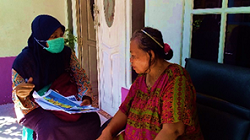Pemberdayaan Masyarakat Mengenai Kepatuhan Diet dan Pengobatan Hipertensi Community Empowerment Regarding Diet Compliance and Hypertension Treatment
Main Article Content
Abstract
Hypertension is a non-communicable disease with an increasing incidence, especially in the elderly. One of the reasons is that many sufferers do not routinely even take medication after experiencing hypertension. In addition to medication, dietary factors can also increase the risk of an increase in blood pressure. Community service is expected to be able to help health problems independently. Community empowerment is carried out by introducing regional conditions, introspective surveys, deliberation, participatory planning, implementation of activities, and sustainability development. The implementation is carried out by providing health education about hypertension diet and medication adherence by using poster media entitled “CAT HITAM” during a pandemic, before and after the activity, pretest-posttest is carried out to determine dietary knowledge and medication adherence for hypertension sufferers, Health Education regarding activities that can be done, recommended food consumption, and medication adherence that hypertension sufferers must adhere to during a pandemic. The pretest-posttest results showed differences in knowledge of diet and medication before and after health education with a p-value <0.05. Dietary problems from the results of community assessments are mostly about the limits of salt consumption for hypertension and treatment. Most of the respondents said they stopped treatment because they felt they had no complaints. It needs cooperation from various parties to continuously motivate the elderly to follow the rules of diet and treatment of hypertension.
Downloads
Article Details
Authors who publish with this journal agree to the following terms:
- Any article on the copyright is retained by the author(s).
- Author grant the journal, right of first publication with the work simultaneously licensed under a Creative Commons Attribution License that allows others to share work with acknowledgment of the work authors and initial publications in this journal.
- Authors are able to enter into a separate, additional contractual arrangements for non-exclusive distribution of published articles of work (eg, post-institutional repository) or publish it in a book, with acknowledgment of its initial publication in this journal.
- Authors are permitted and encouraged to post their work online (e.g., in institutional repositories or on their websites) prior to and during the submission process, as can lead to productive exchanges, as well as earlier and greater citation of published work.
- The article and any associated published material is distributed under the Creative Commons Attribution-ShareAlike 4.0 International License
References
Aryzki, S., Akrom, A. 2018. Pengaruh Brief Counseling Terhadap Konsumsi Lemak Pada Pasien Hipertensi di RSUD dr. H. Moch Ansari Saleh Banjarmasin. JSFK (Jurnal Sains Farmasi & Klinis). 5(1):33-40. https://doi.org/10.25077/jsfk.5.1.33-40.2018
Firmawati, E., Rasyida, Z.M., Santosa, T. 2015. Pengaruh Blog Edukatif Tentang Hipertensi Terhadap Pengetahuan Tentang Hipertensi dan Perilaku Diet Hipertensi pada Pasien Hipertensi di Wilayah Kerja Puskesmas Wirobrajan Yogyakarta. IJNP (Indonesian Journal of Nursing Practices). 1(2):99-108. https://doi.org/10.18196/ijnp.v1i2.649
Gwadry-Sridhar, F.H., Manias, E., Lal, L., Salas, M., Hughes, D.A., Ratzki-Leewing, A., Grubisic, M. 2013. Impact of interventions on medication adherence and blood pressure control in patients with essential hypertension: a systematic review by the ISPOR medication adherence and persistence special interest group. Value Health. 16(5):863-871. https://doi.org/10.1016/j.jval.2013.03.1631
Kementerian Kesehatan Republik Indonesia. 2019. Buku Saku Tahapan Pemberdayaan Masyarakat Bidang Kesehatan Bagi Kader. Jakarta: Direktorat Promosi Kesehatan dan Pemberdayaan Masyarakat Kementerian Kesehatan Republik Indonesia.
Kementerian Kesehatan Republik Indonesia. 2018. Hasil Utama RISKESDAS 2018. Jakarta: Badan Penelitian dan Pengembangan Kesehatan Kementerian Kesehatan Republik Indonesia.
Kementerian Kesehatan Republik Indonesia. 2011. Promosi Kesehatan Di Daerah Bermasalah Kesehatan. Jakarta: Pusat Promosi Kesehatan Kementerian Kesehatan Republik Indonesia.
Kumala, M. 2014. Peran Diet Dalam Pencegahan Dan Terapi Hipertensi. Damianus Journal of Medicine. 13(1):50-61.
Muhlishoh, A., Nurzihan, N.C. 2020. Upaya Perubahan Perilaku Makan Pada Penderita Hipertensi Melalui Konseling Gizi di Wilayah Puskesmas Gambirsari, Surakarta. Jurnal Pengabdian Kepada Masyarakat Ungu (ABDI KE UNGU). 2(2):77-81.
Pradono, J., Senewe F., Kristanti, C.M., Soemantri, S. 2005. Transisi kesehatan di indonesia (kajian data surkesnas). Jurnal Ekologi Kesehatan. 4(3):336-350.
Putri, N.G., Herawati, Y.T., Ramani, A. 2019. Peramalan Jumlah Kasus Penyakit Hipertensi Di Kabupaten Jember Dengan Metode Time Series. Journal of Health Science and Prevention. 3(1):39-46. https://doi.org/10.29080/jhsp.v3i1.161
Supardan, I., 2013. Pemberdayaan Masyarakat Bidang Kesehatan. Bandung: Bumi Aksara
Susanti, Y., Anita, A., Santoso, D.Y.A. 2021. Perilaku Cerdik Penderita Hipertensi Dimasa Pandemi Covid 19. Jurnal Keperawatan. 13(1):61-76. https://doi.org/10.32583/keperawatan.v13i1.1116
Suyoto, S., Agushybana, F., Suryoputro, A. 2020. Pengaruh Penggunaan Aplikasi Patuh Terhadap Kepatuhan Melakukan Diet Hipertensi pada Pasien Hipertensi di Kabupaten Wonosobo. Jurnal Penelitian dan Pengabdian kepada Masyarakat UNSIQ. 7(1):31-37. https://doi.org/10.32699/ppkm.v7i1.956
World Health Organization. 2013. Global Health Observatory (GHO) Raised Blood Pressure Situation and Trends. https://www.who.int/gho/publications/world_health_statistics/EN_WHS2013_Full.pdf
